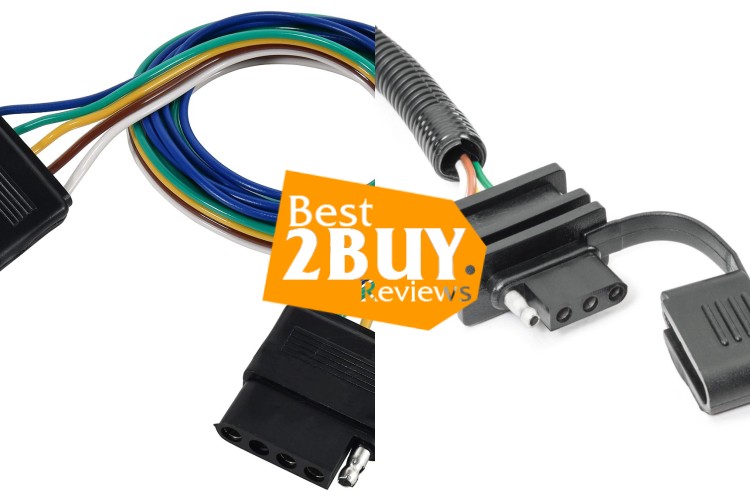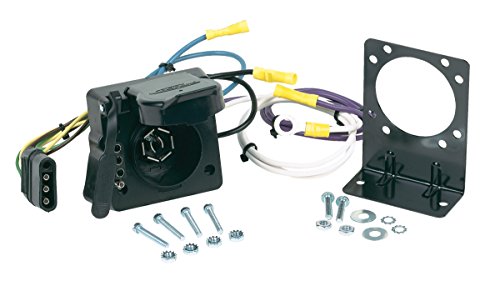Are you looking for reliable and safe towing hitch wiring? Look no further! In this guide, we'll explain everything you need to know about towing hitch wiring.
- 1. What is Towing Hitch Wiring
- 2. Components of towing hitch wiring
- 2.1. Tail Lights
- 2.2. Brake Lights
- 2.3. Turn Signals
- 2.4. Reverse Lights
- 2.5. Electric Brakes (if equipped)
- 2.6. 12V Power
- 3. Types of Towing Hitch Wiring
- 3.1. Flat-4 Connector
- 3.2. Flat-5 Connector
- 3.3. Round 6-Pin Connector
- 3.4. Round 7-Pin Connector
- 3.5. Custom Wiring Harness
- 4. Tips for choosing Towing Hitch Wiring
- 4.1. Know Your Vehicle's Towing Capacity
- 4.2. Identify Your Trailer's Electrical Needs
- 4.3. Choose the Correct Connector Type
- 4.4. Consider a Wiring Kit
- 4.5. Check for Quality and Durability
- 4.6. Ensure Proper Length
- 4.7. Consider a Wiring Extension
- 4.8. Professional Installation
- 4.9. Regular Maintenance
- 5. In conclusion
What is Towing Hitch Wiring
Towing hitch wiring refers to the electrical system that allows a vehicle to safely tow a trailer or caravan while ensuring that all the necessary lights and signals on the trailer are properly synchronized with the vehicle's lights and signals. This ensures that other drivers can see and understand the intentions of the vehicle and the trailer while on the road, promoting safety.

Components of towing hitch wiring
The towing hitch wiring typically includes various connectors and wiring that link the vehicle's electrical system to that of the trailer. The most common connector used for this purpose is a "trailer hitch plug" or "trailer connector," which is mounted on or near the rear bumper of the vehicle. The connector has multiple pins or prongs, each serving a specific purpose:
Tail Lights
Provides power to the trailer's tail lights, making them illuminate when the vehicle's headlights are turned on.
Brake Lights
Activates the trailer's brake lights when the vehicle's brakes are applied.
Turn Signals
Enables the trailer's turn signals to synchronize with the vehicle's turn signals, indicating the intended direction.
Reverse Lights
Activates the trailer's reverse lights when the vehicle is put into reverse gear, helping with visibility while backing up.
Electric Brakes (if equipped)
In some cases, the towing hitch wiring includes connections to activate electric brakes on the trailer, which are synchronized with the vehicle's braking system.
12V Power
Provides power from the vehicle to charge the trailer's battery or run accessories like interior lights or small appliances in the trailer.
To establish the connection between the vehicle and the trailer, a corresponding trailer wiring harness is required, which is specific to the vehicle's make and model. Some vehicles come with pre-installed towing packages that include the necessary wiring harness and connectors, while for others, it may need to be installed separately.
Types of Towing Hitch Wiring
There are several types of towing hitch wiring setups used to connect a vehicle to a trailer. The type of towing hitch wiring depends on the vehicle's make and model, as well as the type of trailer being towed. Here are some common types of towing hitch wiring:
Flat-4 Connector
The Flat-4 connector is one of the most basic and commonly used types of trailer wiring. It consists of four pins and provides connections for the vehicle's tail lights, brake lights, and turn signals. This type of wiring is suitable for small trailers, such as utility trailers, small boats, or motorcycle trailers, that have basic lighting needs.
Flat-5 Connector
Similar to the Flat-4 connector, the Flat-5 connector has five pins and includes the connections for the tail lights, brake lights, and turn signals. Additionally, it has a pin for the ground connection, which improves the electrical stability between the vehicle and the trailer.
Round 6-Pin Connector
The round 6-pin connector is typically used for trailers that have more complex lighting and electrical systems. It provides connections for the tail lights, brake lights, turn signals, reverse lights, and a 12V power supply to charge the trailer's battery or run accessories. This type of wiring is common for larger trailers, including enclosed trailers and some recreational vehicles (RVs).
Round 7-Pin Connector
The round 7-pin connector is the most versatile and commonly used towing hitch wiring setup. It includes all the connections found in the round 6-pin connector, plus an additional pin for electric brakes. This type of wiring is necessary for trailers equipped with electric brakes, providing the vehicle with the ability to control the trailer's braking system. Round 7-pin connectors are often used for large trailers, horse trailers, travel trailers, and caravans.
Custom Wiring Harness
In some cases, vehicles may require custom wiring harnesses, especially if they did not come with a factory-installed towing package. Custom wiring harnesses are specifically designed to fit a particular vehicle's electrical system and provide the necessary connections for towing.
It's essential to use the appropriate towing hitch wiring setup for your specific vehicle and trailer combination. Using the correct wiring ensures proper electrical synchronization between the vehicle and the trailer, promoting safety and compliance with traffic regulations. If you're unsure about the right towing hitch wiring for your vehicle and trailer, consult your vehicle's owner's manual or seek assistance from a professional mechanic or trailer dealer.
Tips for choosing Towing Hitch Wiring
When choosing towing hitch wiring for your vehicle and trailer setup, there are several important factors to consider to ensure a safe and effective towing experience. Here are some tips to help you make the right choice:
Know Your Vehicle's Towing Capacity
Before selecting towing hitch wiring, familiarize yourself with your vehicle's towing capacity. The owner's manual or manufacturer's website will have this information. The towing capacity will determine the size and weight of the trailer you can safely tow, which, in turn, affects the type of wiring needed.
Identify Your Trailer's Electrical Needs
Determine the electrical requirements of your trailer. Consider the number and type of lights (tail lights, brake lights, turn signals, reverse lights) your trailer has, as well as if it has electric brakes. This will help you choose the appropriate towing hitch wiring setup with the right number of pins and connectors.
Choose the Correct Connector Type
Based on your trailer's electrical needs, select the appropriate connector type. Common options include Flat-4, Flat-5, round 6-pin, and round 7-pin connectors. Ensure the connector type you choose matches the one on your trailer and is compatible with your vehicle's wiring system.
Consider a Wiring Kit
If your vehicle didn't come with a factory-installed towing package, consider purchasing a wiring kit that is designed specifically for your vehicle's make and model. Wiring kits provide a plug-and-play solution, making installation easier and ensuring compatibility with your vehicle's electrical system.
Check for Quality and Durability
Invest in high-quality towing hitch wiring that is designed to withstand the rigors of towing and exposure to various weather conditions. Look for wiring made from durable materials, and ensure the connectors are well-built and corrosion-resistant.
Ensure Proper Length
Choose a wiring harness that is long enough to reach from the rear of your vehicle to the hitch receiver and the trailer without being too loose or too taut. It's better to have some extra length than not enough.
Consider a Wiring Extension
If your trailer's wiring is not long enough to reach the vehicle's connector, consider getting a wiring extension to bridge the gap. Again, ensure the extension matches the connector type of your existing wiring.
Professional Installation
If you're not familiar with automotive electrical systems, consider having the towing hitch wiring installed by a professional. Proper installation is crucial to ensure all connections are secure and functioning correctly.
Regular Maintenance
Once the towing hitch wiring is installed, periodically inspect it for any signs of wear, damage, or corrosion. Keeping the wiring in good condition ensures reliable performance and safety during towing.
By following these tips and selecting the right towing hitch wiring for your vehicle and trailer, you can enjoy a safe and trouble-free towing experience.
In conclusion
Properly functioning towing hitch wiring is essential for safe towing, as it ensures that all necessary lights and signals are operational, making the trailer visible to other road users and helping to prevent accidents.
With our tips, we hope that you will choose ringht towing hitch wiring for yourselft, you can check out Amazon and shopping online. We also selected top best towing hitch wiring is best in maket, it is also selling in Amazon. You can refer and exerience it.
I’m Jane Smith - editor at best2buy.reviews. I’m always availabe to respone any your question. If you need, comment below.











